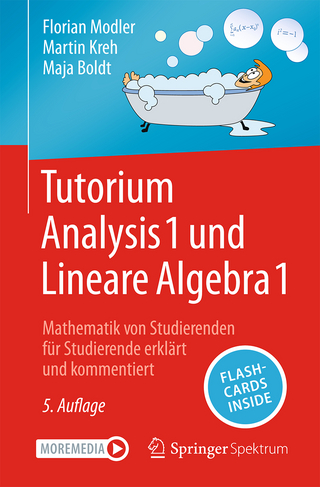
Key Concept Activity Lab Workbook for Developmental Mathematics
Pearson (Verlag)
978-0-13-516440-2 (ISBN)
- Titel z.Zt. nicht lieferbar
- Versandkostenfrei
- Auch auf Rechnung
- Artikel merken
The Key Concept and Activity Lab Workbook is a great way to engage students in conceptual projects and exploration, as well as group work. The Workbook includes Extension Exercises, Exploration Activities, Conceptual Exercises, and Group Activities.
0135164400 / 9780135164402 KEY CONCEPT ACTIVITY LAB WORKBOOK FOR DEVELOPMENTAL MATHEMATICS, 4/e
Elayn Martin-Gay has taught mathematics at the University of New Orleans for more than 25 years. Her numerous teaching awards include the local University Alumni Association’s Award for Excellence in Teaching, and Outstanding Developmental Educator at University of New Orleans, presented by the Louisiana Association of Developmental Educators. Prior to writing textbooks, Elayn Martin-Gay developed an acclaimed series of lecture videos to support developmental mathematics students. These highly successful videos originally served as the foundation materials for her texts. Today, the videos are specific to each book in her series. She has also created Chapter Test Prep Videos to help students during their most “teachable moment” – as they prepare for a test – along with Instructor-to-Instructor videos that provide teaching tips, hints, and suggestions for every developmental mathematics course, including basic mathematics, prealgebra, beginning algebra, and intermediate algebra. Elayn is the author of 13 published textbooks and a new Interactive Assignment MyLab Math course, all specializing in developmental mathematics courses. She has participated as an author across a broad range of educational materials: textbooks, videos, tutorial software, and courseware. This offers an opportunity for multiple combinations for an integrated teaching and learning package, offering great consistency for the student.
The Whole Numbers
1.1 Study Skills Tips for Success in Mathematics
1.2 Place Value, Names, and Reading Tables
1.3 Adding Whole Numbers and Perimeter
1.4 Subtracting Whole Numbers
1.5 Rounding and Estimating
1.6 Multiplying Whole Numbers and Area
1.7 Dividing Whole Numbers
Integrated Review-Operations on Whole Numbers
1.8 An Introduction to Problem Solving
1.9 Exponents, Square Roots, and Order of Operations
Multiplying and Dividing Fractions
2.1 Introduction to Fractions and Mixed Numbers
2.2 Factors and Prime Factorization
2.3 Simplest Form of a Fraction
Integrated Review-Summary on Fractions, Mixed Numbers, and Factors
2.4 Multiplying Fractions and Mixed Numbers
2.5 Dividing Fractions and Mixed Numbers
Adding and Subtracting Fractions
3.1 Adding and Subtracting Like Fractions
3.2 Least Common Multiple
3.3 Adding and Subtracting Unlike Fractions
Integrated Review-Operations on Fractions and Mixed Numbers
3.4 Adding and Subtracting Mixed Numbers
3.5 Order, Exponents, and the Order of Operations
3.6 Fractions and Problem Solving
Decimals
4.1 Introduction to Decimals
4.2 Order and Rounding
4.3 Adding and Subtracting Decimals
4.4 Multiplying Decimals and Circumference of a Circle
Integrated Review-Operations on Decimals
4.5 Dividing Decimals and Order of Operations
4.6 Fractions and Decimals
Ratio, Proportion, and Percent
5.1 Ratio and Proportion
5.2 Introduction to Percent
5.3 Percents and Fractions
5.4 Solving Percent Problems Using Equations
5.5 Solving Percent Problems Using Proportions
Integrated Review-Ratio, Proportion, and Percent
5.6 Applications of Percent
5.7 Percent and Problem Solving: Sales Tax, Commission, and Discount
5.8 Percent and Problem Solving: Interest
Geometry
6.1 Lines and Angles
6.2 Plane Figures and Solid
6.3 Perimeter
6.4 Area
6.5 Volume
6.6 Square roots and the Pythagorean Theorem
6.7 Congruent and Similar Triangles
Reading Graphs and Introductions to Statistics and Probability
7.1 Pictographs, Bar Graphs, Histograms, and Line Graphs
7.2 Circle Graphs
Integrated Review- Reading Graphs
7.3 Mean, Median, Mode, and Range
7.4 Counting and Introduction to Probability
Real Numbers and Introductions to Algebra
8.1 Symbols and Sets of Numbers
8.2 Exponents, Order of Operations, and Variable Expressions
8.3 Adding Real Numbers
8.4 Subtracting Real Numbers
Integrated Review-Operations on Real Numbers
8.5 Multiplying and Dividing Real Numbers
8.6 Properties of Real Numbers
8.7 Simplifying Expressions
Equations, Inequalities, and Problem Solving
9.1 The Addition Property of Equality
9.2 The Multiplication Property of Equality
9.3 Further Solving Linear Equations
Integrated Review-Solving Linear Equations
9.4 Further Problem Solving
9.5 Formulas and Problem Solving
9.6 Percent and Mixture Problem Solving
9.7 Linear Inequalities and Problem Solving
Graphing Equations and Inequalities
10.1 The Rectangular Coordinate System
10.2 Graphing Linear Equations
10.4 Slope and Rate of Change
10.5 Equations of Lines
Integrated Review-Summary on Linear Equations
10.6 Introduction to Functions
10.7 Graphing Linear Inequalities in Two Variables
10.8 Direct and Inverse Variation
Systems of Equations
11.1 Solving Systems of Linear Equations by Graphing
11.2 Solving Systems of Linear Equations by Substitution
11.3 Solving Systems of Linear Equations by Addition
Integrated Review-Summary on Solving Systems of Equations
11.4 Systems of Linear Equations and Problem Solving
Exponents and Polynomials
12.1 Exponents
12.2 Negative Exponents and Scientific Notation
12.3 Introduction to Polynomials
12.4 Adding and Subtracting Polynomials
12.5 Multiplying Polynomials
12.6 Special Products
Integrated Review- Exponents and Operations on Polynomials
12.7 Dividing Polynomials
Factoring Polynomials
13.1 The Greatest Common Factor and Factoring by Grouping
13.2 Factoring Trinomials of the Form x2 + bx + c
13.3 Factoring Trinomials of the Form ax2 +bx + c
13.4 Factoring Trinomials of the Form ax2 + bx + c by Grouping
13.5 Factoring Perfect Square Trinomials and the Difference of Two Squares
Integrated Review-Choosing a Factoring Strategy
13.6 Solving Quadratic Equations by Factoring
13.7 Quadratic Equations and Problem Solving
Rational Expressions
14.1 Simplifying Rational Expressions
14.2 Multiplying and Dividing Rational Expressions
14.3 Adding and Subtracting Rational Expressions with the Same Denominator and Least Common Denominator
14.4 Adding and Subtracting Rational Expressions with Different Denominators
14.5 Solving Equations Containing Rational Expressions
Integrated Review-Summary on Rational Expressions
14.6 Rational Equations and Problem Solving
14.7 Simplifying Complex Fractions
Roots and Radicals
15.1 Introduction to Radicals
15.2 Simplifying Radicals
15.3 Adding and Subtracting Radicals
15.4 Multiplying and Dividing Radicals
Integrated Review-Simplifying Radicals
15.5 Solving Equations Containing Radicals
15.6 Radical Equations and Problem Solving
Quadratic Equations and Nonlinear Graphs
16.1 Solving Quadratic Equations by the Square Root Property
16.2 Solving Quadratic Equations by Completing the Square
16.3 Solving Quadratic Equations by the Quadratic Formula
Integrated Review-Summary on Solving Quadratic Equations
16.4 Graphing Quadratic Equations in Two Variables
16.5 Interval Notation, Finding Domains and Ranges from Graphs, and Graphing Piecewise-Defined Functions
Appendices
A. Further Algebra Topics
B. Tables
| Erscheinungsdatum | 15.01.2019 |
|---|---|
| Sprache | englisch |
| Themenwelt | Mathematik / Informatik ► Mathematik ► Algebra |
| ISBN-10 | 0-13-516440-0 / 0135164400 |
| ISBN-13 | 978-0-13-516440-2 / 9780135164402 |
| Zustand | Neuware |
| Informationen gemäß Produktsicherheitsverordnung (GPSR) | |
| Haben Sie eine Frage zum Produkt? |
aus dem Bereich


